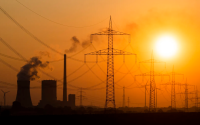Q. Why did you decide to bring the word "fascism" into the debate about American empire?I felt there was a new global political development that needed to be named, and I began thinking in the context of what I call "global fascism," which is something different from the traditional forms of fascism that have existed. The effect of that was to suggest that resistance to this new global development in the United States poses a second kind of danger that is more in keeping with traditional understandings of fascism.Q. Can you tell us your definition of traditional fascism?Yes: the convergence of military and economic power on behalf of an ultranationalist ideology that views its enemies - internally and externally - as evil and subject to extermination or extreme punishment.Q. Is the US the only player?No, it's not the only player, though it's certainly the dominant player. It's setting the rules for the other players. You've noticed in recent days that there's been a kind of reward given to those that lined up behind the war against Iraq - visits to the White House honoring and giving prestige to these countries in Eastern Europe, and to Spain and Australia, and the marked avoidance of the countries that didn't cooperate. It's a kind of geopolitical disciplining, an attempt to impose costs and benefits for following this path of global regulation and order.Q. What should we be looking for as an early warning of a slide toward fascism?A disillusionment with representative democracy as a path to change. For example, if the Democratic Party in the United States doesn't elect a candidate who will challenge these policies, I think it would lead an increasing number of people to become disenchanted with normal politics and be more inclined to feel that the only way change can come about is by more extreme political tactics, which in turn would lead the government to feel justified in expanding its powers of control over the citizenry.Q. What relationship do you see between the economic globalization of the past decade and this emerging possibility of global fascism?Well, I think there is some linkage between the two. Economic globalization did create this sense of an integrated global order, and that this degree of integration could be achieved by economic means. What has changed - partly through the change in leadership in the United States, and accelerated by the response to September 11 - is that the trend towards integration and control has been decisively militarized and ideologized.Q. In some respects, the new militarization seems to be a reaction against globalization.That was always part of the debate - how multilateral globalization was. Part of the debate was also whether the nation-states - including the most powerful countries - were themselves losing their freedom to maneuver to these market forces, and that the source of power was more in the world economic forum and in the financial markets than in the capital cities of the nation-states. Now there's a new ascendency of the security agenda, which means that the state has revived its control over politics.Q. Is the language being used by the current American leadership consistent with historical fascism? In many ways, the language is very careful. No one today has the bluntness of a Hitler or a Mussolini.I think the discourse of terrorism is very much the kind of language that seeks to validate extreme forms of violence and a war mentality, and it is reinforced by this ultranational sentiment. The language has shifted in Orwellian directions, where the search for peace becomes perpetual war. At the same time, it is important to acknowledge that if this fascist threat exists, it exists in a distinctive form both in the United States and in the world, and that it is conditioned by the American political culture - which is resistant to the language of fascism. Certainly the people who are the architects of these policies would reject my analysis, and probably sincerely so. They think they're doing something else: it will all be done in the name of democratization. It's a very deceptive and confusing style of political domination, because it pretends to be the opposite of what it is.There is an ambiguity, because this is a concealed fascism that is occurring within the framework of a constitutional democracy. There is still at least the formal possibility that change can come about through the normal forms of political opposition. It doesn't seem likely at the moment, but it can't be ruled out. My whole argument is in a sense a preventive one, because I'm not suggesting that this kind of fascism currently exists, only that the trends and the policies suggest the importance of preventing it from existing.Q. Do you consider what you're seeing to be a less frightening form of fascism than we've seen in the past 100 years?Well, it's hard to compare. For instance, Spanish-Franco and Portuguese-Salazar forms of fascism were less terrifying in their effects than Nazism. Today, the special concern is associated partly with the stakes being raised much higher by the weapons of mass destruction. The technology of violence has become much worse, so that if this form of fascism was to result in a major confrontation, it could lead to worse forms of warfare than were experienced in the 20th century. The other concern is that it is global in scope, which has never existed before, and which one needs to understand was a part of the structure prior to the Bush administration and prior to September 11. The whole effort of the US to militarize space and to establish a system of military bases around the world, with no strategic enemy, and its unwillingness to even consider nuclear disarmament - all of those factors do indicate the presence of a kind of global-dominance project.Q. If we are confronting fascism, what do we know from history about resisting it?It's difficult. (Laughter.) It's very difficult, because the methods and the mentality of those who are controlling and developing this kind of politics of domination are such that they have no willingness to accommodate their adversaries. So there's no room for politics, in a way. And that makes it . . . it almost certainly drives the conflict toward a collision of extremes.Richard Falk is a visiting professor of global studies at the University of California, Santa Barbara, and a professor emeritus of international law at Princeton University. Falk was interviewed by James MacKinnon.From the July/August 2003 issue of Adbusters magazine.http://www.adbusters.org/magazine/48/articles/early_signs_of_fascism.html
Canlı Yayın
Kâinatın tüm seslerine, renklerine, titreşimlerine Açık Radyo...
Ekolojiden siyasete, edebiyattan müziğe Apaçık Radyo'da haftanın öne çıkan gündemleri mail kutunuzda!
İletişim
Açık Medya Yayıncılık A.Ş.
Koltukçular Çıkmazı No 7 İç Kapı No 2
Tophane, Beyoğlu, İstanbul, TR-34425
Telefon: +90 212 343 4040
Faks: +90 212 232 3219
E-posta: [email protected]






